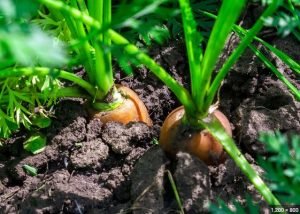The information in this post, according to my opinion, will be very useful in resolving your question about carrots. I hope this article will be helpful to you.Carrot weed Look Like weed Can you consume too many benefits from carrots.Discover what carrot seedlings look like in this comprehensive guide. Learn how to identify carrot seedlings, their growth stages, and what to expect during their development.
介紹
What do carrot seedlings🥕 look like is a question you might have if you’re new to gardening. Carrot seedlings can be confused for other plants while they are young, therefore this is a legitimate inquiry. In this extensive tutorial, we’ll explain how to recognise carrot🥕 seedlings and give you details on the various phases of growth. Carrot weed Look Like We will also address frequently asked issues regarding the traits of carrot seedlings, enabling you to grow wholesome and mouthwatering carrots🥕 in your garden.
What Do Carrot Seedlings Look Like?

When carrot seedlings initially pop🥕 out of the ground, they resemble thin, green blades of grass.
1)They do, 然而, acquire traits🥕 as they mature that set them apart from other plants. Following are some distinguishing characteristics of carrot seedlings:
2)Narrow Leaves: The rosette-shaped Carrot weed Look Like leaves of carrot seedlings are narrow and fern-like. They resemble small ferns because of their typically light green, hairy leaves.
3)Carrot seedlings with young🥕 purple stems eventually🥕 turn green🥕 as they age. Anthocyanin, a pigment that aids in the plant’s defence against ultraviolet radiation, is the source of the purple hue.
4)Roots That Look Like Carrots🥕: As the seedling matures, a taproot that like a small carrot appears. White in colour and bearing.
Growth Stages of Carrot Seedlings
It’s critical to comprehend the various stages of carrot seedling growth because doing so can assist you decide when to thin or transplant them. The four development phases of carrot seedlings are as follows:
1)When a seedling first appears out of the ground, it is said to have undergone germination, the initial stage of growth. The plant only has one or two leaves at this point, and the taproot is only beginning to form.
2)Seedling: The plant has four or more leaves at this stage, and the taproot is lengthening. It’s crucial to use caution when watering or handling the plant because it’s still young and sensitive.
3)Vegetative: The plant is developing quickly and the taproot is becoming thicker during the vegetative stage.
常見問題
Depending on the soil’s temperature🥕 and moisture content, carrot seedlings normally take two to three weeks to sprout.
Although carrot seedlings don’t need direct🥕 sunshine, they still need sunlight. They can develop either in grow lights or in some shade.
If the soil is dry, carrot seedlings may need🥕 to be watered more frequently.
You can move carrot seedlings, but you must be🥕 careful to prevent injuring the plants.
Daucus carota, sometimes known as carrot🥕 weed, is a biennial plant that is indigenous to Europe and Asia. Many areas of the world, including North America, where it is now considered a common weed, have allowed it to become naturalized. In fields, meadows, gardens, and by the sides of roads, carrot weed can be found.
Although 🥕carrot weed can reach heights of three feet, its average height🥕 is between one and two feet.
The leaves of 🥕carrot weed are split finely and have a fluffy look. The stems have a purple hue and are hairy. Small white flower clusters in the shape of an umbrella are produced by the plant. Spiny seed heads that resemble tiny bird nests follow the petals.
Carrot🥕 weed isn’t toxic, no. 然而, poison hemlock, which is extremely toxic, is frequently confused with it. The stems of carrot weed are hairy, while those of poison hemlock are smooth.
Additional faqs
The young leaves and blooms of carrot🥕 weed can be added to salads because they are edible. When searching for carrot weed, it’s crucial to exercise caution because it can easily be mistaken for poison hemlock.
The finely divided leaves, hairy stems, and clusters of tiny white flowers that resemble umbrellas help to distinguish carrot🥕 weed from other plants. The hairy stems help to identify it from other members of the carrot family, such as wild parsley and wild chervil, which are sometimes confused with it.
🥕Carrot weed reproduces up to 40,000 seeds per plant🥕 and disperses through seed. Animals, people, and the wind all disseminate the seeds.
係, if left unchecked, carrot🥕 weed can spread. It produces a lot of seeds and can quickly engulf a region. 此外, it has the potential to hybridize with the edible carrot plant, producing wild carrots with undesirable characteristics.
The root must be completely removed when controlling carrot🥕 weed by hand picking or hoeing. Chemical herbicides can also be sprayed, although caution must be taken to prevent harm to surrounding plants.
係, there are some advantages to using carrot weed. It draws lacewings, ladybugs, and parasitic wasps—all helpful insects.
conclusion
According to me it can be difficult to identify carrot seedlings, but with the appropriate knowledge, it’s simple to tell them apart from other plants. Carrot seedlings resemble small carrot🥕s with their white, fern-like taproots🥕, purple stems, and short, fern-like leaves. For effective care🥕 and maintenance of carrot seedlings, it is also essential🥕 to understand their🥕 developmental stages. You can make sure that your carrot seedlings grow healthy and robust by being aware of what to anticipate during the germination, seedling, vegetative, and mature stages. Hence, whether you’re a novice🥕 or seasoned gardener, it’s imperative to understand what carrot seedlings look like to grow excellent and nourishing carrots🥕.